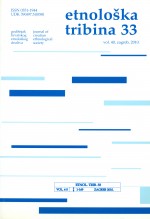Kazivanja o nadnaravnom - prema lokalnim temeljima grupne pripadnosti
Accounts of the Supernatural - Toward Local Foundations of Group Belonging
Author(s): Luka ŠešoSubject(s): Customs / Folklore, Sociology, Cultural Anthropology / Ethnology
Published by: Hrvatsko etnološko društvo
Keywords: supernatural beings; traditional beliefs; informants; group belonging;
Summary/Abstract: Recent field research of belief in supernatural beings in Dalmatia’s hinterland suggests that the research of belief in fairies, witches, moras and werewolves can offer some general insights into local belonging of certain population groups. This paper focuses on two such groups and their attitude toward believing in supernatural beings. The First groups is composed of informants from the Dalmatinska Zagora region who emphasize their own knowledge of the legends about supernatural beings and frequently witness and interpret personal experience and encounters with fairies, moras, witches and werewolves. The accounts attempt to reconstruct collective memories. Each of the informants tries to add something to the initial story, tries to remember additional elements to complete it, in order to underline their belonging to the tradition of their village. The knowledge of information, details, the stressing of one’s own involvement in the encounter with supernatural beings makes them qualified members of the local community. On the other hand, a group of informants from Bukovica, although evidently privy to the researched topic, is almost always inclined towards negation, self-censorship and rationalizing when it comes to believing in supernatural beings. Unlike Dalmatinska Zagora, where informants identify the knowledge of and telling stories about supernatural beings as part of their tradition and as a symbol of local belonging, primarily due to the homogeneousness of their group or region, the people from Bukovica, whether ethnic Serbs or Croats, consider these beliefs and stories as something “forbidden” or at least not recommended. In other words, the inhabitants of Bukovica are prone to negation, self-censorship and rationalizing when it comes to supernatural beings because, in their attempts at achieving a peaceful coexistence, they do not want to compromise themselves as backward or primitive Croatian or Serbian returning refugees, thus avoiding the negative image in the eyes of the “intellectual” elite.
Journal: Etnološka tribina : Godišnjak Hrvatskog etnološkog društva
- Issue Year: 40/2010
- Issue No: 33
- Page Range: 107-115
- Page Count: 9
- Language: Croatian
- Content File-PDF

